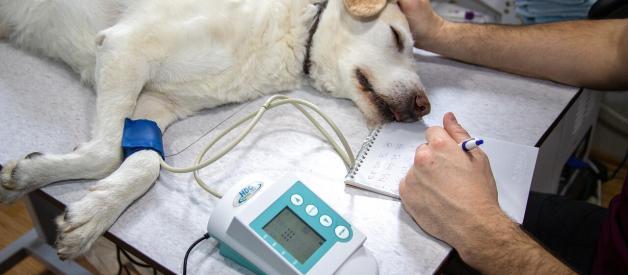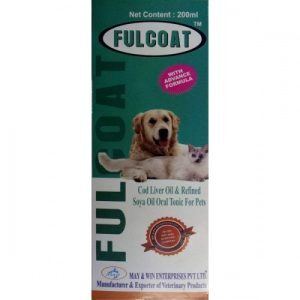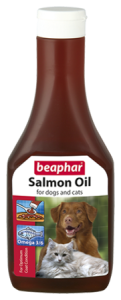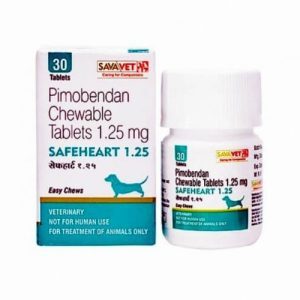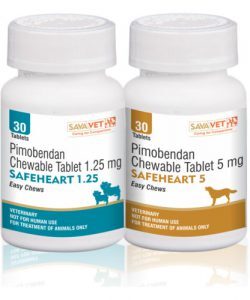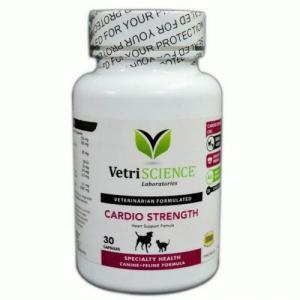Table of Contents
Heart failure in dogs and cats can significantly impact their quality of life and potentially be life-threatening if left untreated. Proper treatment can help manage symptoms, improve cardiac function, and prolong the pet’s lifespan. Early intervention and ongoing management can also prevent or minimize the progression of the disease, allowing pets to live a more comfortable and active life.

What Is Heart Failure in Cats and Dogs?
Heart failure in cats and dogs is a condition where the heart’s ability to pump blood effectively is compromised, leading to a cascade of symptoms and potential organ damage. It occurs when the heart muscle weakens or stiffens or the heart chambers become enlarged or thickened, resulting in inadequate blood circulation. As a result, fluid can accumulate in the lungs, abdomen, or other body tissues, causing symptoms such as difficulty breathing, coughing, lethargy, exercise intolerance, and in severe cases, collapse. Various factors, including genetic predisposition, heart valve disease, high blood pressure, heartworm infection, congenital heart defects, or other underlying health conditions, can cause heart failure.
Types of Heart Disease in Pets
There are several types of heart disease in pets. Here are some common types of heart disease in cats and dogs.
Valvular Disease
This is a condition where the heart valves, particularly the mitral or tricuspid valves, become faulty and do not close properly, leading to the regurgitation of blood (mitral valve heart disease in dogs and cats). It is commonly seen in older dogs, especially small breeds.
Arrhythmogenic Right Ventricular Cardiomyopathy (ARVC)
ARVC is a genetic condition where the heart muscle in the right ventricle becomes weakened and replaced with fatty or fibrous tissue. It can lead to abnormal heart rhythms and impaired heart function, primarily affecting certain dog breeds. Sometimes veterinarians prescribe genetic heart disease in dogs tests.
Heartworm Disease
A parasitic infection transmitted by mosquitoes cause heartworm disease. The worms infest the heart, lungs, and blood vessels, causing damage and heart failure if left untreated. Both dogs and cats can be affected.
Dilated Cardiomyopathy (DCM)
DCM is a condition characterized by the dilation and thinning of the heart chambers, leading to decreased cardiac function. It can be genetic or associated with nutritional deficiencies, affecting various dog breeds, including Doberman Pinschers and Great Danes.
Myocarditis
Myocarditis refers to heart muscle inflammation, often caused by viral or bacterial infections. It can affect dogs and cats and may result in heart failure or abnormal heart rhythms.
Congenital Abnormalities
What is congenital heart disease in dogs?
Congenital heart disease in dogs and cats are defects present at birth, ranging from structural issues in heart chambers or valves to abnormal blood vessels. These conditions can affect both dogs and cats, and the severity and specific types of abnormalities vary.
This is not an exhaustive list; other types of heart disease can also affect pets. Proper diagnosis and treatment by a veterinarian are essential for managing and treating these conditions effectively.
Causes of Heart Disease in Dogs and Cats
What can cause heart disease in dogs?
The causes of heart disease in dogs and cats can vary depending on the specific type of heart disease. Here are some common causes:
- Genetic Factors: Some heart diseases, such as dilated cardiomyopathy (DCM) in certain dog breeds, have a genetic predisposition. Genetic mutations or abnormalities can affect the structure or function of the heart, leading to disease.
- Age and Aging: As pets age, their risk of developing heart disease increases. Older dogs and cats are more prone to conditions like valvular heart disease in dogs described in this article and cardiomyopathies.
- Heartworm Infection: Heartworm disease, caused by the parasitic worm Dirofilaria immitis, is transmitted through mosquito bites. If left untreated, heartworms can infest the heart and major blood vessels, leading to heart failure and severe damage.
- Infections: Bacterial, viral, or fungal infections are another cause for heart disease in dogs and cats. They can cause myocarditis (heart muscle inflammation) in dogs and cats. These infections can damage the heart and disrupt its normal function.
- Nutritional Deficiencies: In some cases, nutritional deficiencies, specifically taurine deficiency in cats, can contribute to the development certain types of heart disease, such as dilated cardiomyopathy (DCM). Ask your veterinarian about diet for heart disease in cats and dogs.
- High Blood Pressure: Chronic high blood pressure (hypertension) can strain the heart and lead to the development of heart disease, including heart failure.
- Other Underlying Health Conditions: Certain medical conditions, such as thyroid disease, kidney disease, or diabetes, can impact heart health and increase the risk of developing heart disease in pets.
The causes can vary depending on the specific type of heart disease and individual factors. Consulting a veterinarian is crucial to determine the underlying cause and provide appropriate treatment for pets with suspected or diagnosed heart disease.
Signs of Heart Failure in Pets
What are the signs of heart disease in dogs?
Here are some signs commonly associated with heart failure in pets. Here are more details about each symptom:
Persistent Cough
Dogs and cats with heart failure may develop a persistent cough that can be dry or moist. It often worsens during physical activity or when the pet is lying down. The cough is typically caused by fluid accumulation or irritation in the lungs.
Difficulty Breathing
Pets with heart failure may experience difficulty breathing or labored breathing, known as dyspnea. They may exhibit rapid or shallow breathing, increased respiratory effort, or open-mouth breathing. This symptom is often more pronounced during exercise or rest, especially when lying down.
Fainting or Collapse
In severe cases of heart failure, pets may experience fainting episodes or sudden collapses. This can occur due to a lack of sufficient oxygenated blood reaching the brain, leading to temporary loss of consciousness.
Behavior Changes
Pets with heart failure may exhibit behavior changes, such as decreased activity levels, lethargy, or weakness. They may be less willing to engage in physical activity, tire more easily, or show reduced interest in things they previously enjoyed.
What are other symptoms of heart disease in dogs?
Other potential signs of heart failure in pets can include:
- tiring easily during exercise;
- restlessness or pacing;
- abdominal swelling or bloating;
- reduced appetite or weight loss;
- cyanosis (a bluish tinge to the gums or tongue);
- weak pulse or abnormal heart rhythms (palpitations).
These signs can also indicate other medical conditions, so a proper veterinary evaluation is necessary to diagnose heart failure or any underlying health issues in pets.
Diagnosing Heart Disease in Dogs and Cats
How to diagnose heart disease in dogs?
When you address veterinarians, they may suggest several diagnostic methods. Here are some common diagnostic methods used to evaluate and diagnose heart disease in dogs and cats.
Auscultation
Auscultation involves listening to the heart sounds using a stethoscope. Veterinarians can detect abnormal heart sounds, such as murmurs or irregular rhythms, indicating underlying heart conditions.
Chest X-rays
Chest radiographs (X-rays) are used to assess the size, shape, and condition of the heart and evaluate the lungs for signs of congestion or fluid accumulation. They provide valuable information about heart size, chamber enlargement, and associated pulmonary abnormalities.
Blood and Urine Tests
Blood test for heart disease in cats and dogs can help assess organ function, check for markers of inflammation or infection, evaluate electrolyte levels, and measure cardiac-specific biomarkers. Urine tests can also provide information about kidney function and potential cardiac-related abnormalities.
Electrocardiogram (ECG)
An ECG measures the heart’s electrical activity and can identify abnormal heart rhythms (arrhythmias) and abnormalities in the conduction system. It helps in diagnosing and monitoring certain heart conditions.
Ultrasound Examination (Echocardiogram)
An echocardiogram is a specialized ultrasound examination of the heart. It provides detailed images of the heart’s structure and function, including the chambers, valves, and blood flow patterns. Echocardiography is one of the most important diagnostic tools for assessing heart disease in pets.
Additional diagnostic tests that may be used depending on the specific case include:
- blood pressure measurement;
- cardiac catheterization;
- cardiac biomarker testing;
- Holter monitoring (24-hour ECG);
- computed tomography (CT) or magnetic resonance imaging (MRI) for advanced heart imaging.
Combining these diagnostic methods helps veterinarians evaluate the heart’s structure, function, and overall health to make an accurate diagnosis and develop an appropriate treatment plan for pets with heart disease.
The Prognosis for Dogs and Cats with Heart Disease
The prognosis for dogs and cats with heart disease can vary depending on several factors, including the specific type of heart disease, the severity of the condition, the stage at which it is diagnosed, and the animal’s overall health. It’s important to remember that every case is unique, and the prognosis should be discussed with a veterinarian who has evaluated the individual pet.
In some cases, with early detection and appropriate treatment of heart disease in boxer dogs and other pets, the disease can have an improved quality of life and a longer lifespan. Medications, dietary management, lifestyle modifications, and regular veterinary care can help manage symptoms, slow disease progression, and improve the pet’s overall well-being.
However, certain types of heart disease, such as advanced dilated cardiomyopathy (DCM) or end-stage heart failure, may have a more guarded prognosis. These cases may require more intensive management, including advanced cardiac medications, interventions such as pacemakers or surgery, and a more cautious outlook.
Pet owners must work closely with their veterinarian, follow the prescribed treatment plan, and regularly monitor their pet’s condition. Regular check-ups, follow-up diagnostic tests, and adjustments to treatment as needed are crucial for managing heart disease effectively and optimizing the pet’s prognosis.
Overall, the prognosis can vary significantly based on individual factors, but with appropriate care and management, many pets with heart disease can lead a comfortable and fulfilling life.
How to Prevent Heart Disease in Cats and Dogs
How to reverse heart disease in dogs?
While it may not be possible to completely prevent all types of heart disease in cats and dogs, there are measures you can take to reduce the risk and promote heart health. Here are some preventive strategies:
- Regular Veterinary Check-ups: Schedule routine veterinary visits for your pets, even if they appear healthy. Regular check-ups allow for early detection of any potential heart issues and enable timely intervention and treatment.
- Balanced Nutrition: Provide a well-balanced and appropriate diet for your pets, following your veterinarian’s recommendations. In some cases, specific dietary considerations, such as taurine supplementation in cats, may be necessary to prevent certain types of heart disease.
- Regular Exercise: Engage your pets in regular physical activity appropriate for their age, breed, and health condition. Exercise helps maintain a healthy weight, strengthens the cardiovascular system, and promotes overall well-being.
- Parasite Prevention: Protect your pets from heartworm disease and other parasites by following your veterinarian’s recommendations for preventive medications. Keep your pets on regular heartworm prevention and follow mosquito control measures.
- Genetic Screening: If you are considering getting a purebred dog or cat, research the breed and inquire about genetic health testing. Some breeds have a higher risk of specific heart conditions, and genetic screening can help identify potential issues before they become problematic.
- Dental Care: Dental health is linked to heart health in pets. Practice good oral hygiene by regularly brushing your pet’s teeth and providing dental treats or toys. Schedule professional dental cleanings as recommended by your veterinarian.
- Stress Reduction: Minimize stress in your pets’ lives and provide a stable, comforting environment. Chronic stress can impact heart health, so provide mental stimulation, a routine, and a safe, calm living environment.
- Avoidance of Toxins: Keep your pets away from toxins, such as certain plants, chemicals, and medications, as exposure to these substances can harm the heart and other organs.
Remember, while these measures can reduce the risk of heart disease, some heart conditions can still develop due to genetic or other factors beyond your control. Regular veterinary care and early intervention are key to managing and treating heart disease in dogs and cats.
Treatment of Heart Disease in Pets
How do you treat heart disease in dogs?
The treatment of heart disease in pets depends on the specific type and severity of the condition. Treatment options may include medications to manage symptoms and improve heart function, dietary modifications, lifestyle changes, and, in some cases, surgical interventions.
FulCoat Oral Tonic for Cats and Dogs (Cod Liver Oil, Soya Oil), 200ml
FulCoat is an oral pet tonic containing cod liver oil and soya oil. It is designed to provide various benefits such as promoting a lustrous and shiny coat, reducing inflammation, improving bone health, alleviating joint pain and symptoms of rheumatoid arthritis, supporting eye health, reducing the risk of heart disease, improving symptoms of anxiety and depression, and aiding in the healing of stomach and gut ulcers.
Active Ingredients
- Cod liver oil is derived from the livers of cod fish. It is a rich source of omega-3 fatty acids, including eicosapentaenoic acid (EPA) and docosahexaenoic acid (DHA). These omega-3 fatty acids have anti-inflammatory properties and provide various health benefits for pets. Cod liver oil is known to support coat health, promoting a lustrous and shiny coat. It also supports skin health and can help alleviate itching and dryness. Additionally, the omega-3 fatty acids in cod liver oil contribute to joint health by reducing inflammation and can aid in the management of conditions such as arthritis. It may also have positive effects on heart health, brain function, and immune system support.
- Soya oil, also known as soybean oil, is derived from soybeans. It is a vegetable oil containing essential fatty acids, including linoleic acid, an omega-6 fatty acid. Soya oil is often included in pet products due to its various benefits. It helps promote healthy skin and coat by providing essential fatty acids to improve skin moisture and reduce dryness. Soya oil also supports overall health by contributing to a balanced diet and providing a source of energy. Additionally, it contains vitamin E, which has antioxidant properties and supports immune function.
Benefits
- Coat Health: The omega-3 fatty acids found in Cod Liver Oil can improve coat texture, reduce shedding, and contribute to a lustrous and shiny coat. With its essential fatty acids, Soya Oil can also help maintain skin moisture and reduce dryness, leading to a healthier and more vibrant coat.
- Joint Health: The omega-3 fatty acids in Cod Liver Oil have anti-inflammatory properties that can help reduce joint inflammation and alleviate joint pain in pets suffering from conditions such as arthritis. By supporting joint health, these oils can improve mobility and overall comfort for pets.
- Skin Health: Cod Liver Oil and Soya Oil contribute to pet skin health. The essential fatty acids in these oils help nourish the skin, maintain its moisture balance, and support a healthy skin barrier. This can be beneficial for pets with dry, itchy, or irritated skin conditions.
- Anti-inflammatory Effects: Cod Liver Oil’s omega-3 fatty acids have natural anti-inflammatory properties that can benefit pets with inflammatory conditions. These oils help reduce inflammation throughout the body, potentially aiding in managing various inflammatory disorders.
- Heart Health: Cod Liver Oil and Soya Oil can support heart health in pets. The omega-3 fatty acids in Cod Liver Oil have been shown to affect heart function positively and can help reduce the risk of certain heart conditions. With its unsaturated fats, Soya Oil can contribute to a heart-healthy diet.
- Overall Wellness: Cod Liver Oil and Soya Oil offer nutritional benefits supporting overall pet wellness. These oils provide essential fatty acids and vitamins that contribute to a balanced diet, help maintain a healthy immune system, and support various bodily functions.
Beaphar Salmon Oil for Dogs and Cats (Salmon Oil), 425ml
Beaphar Salmon Oil is a natural remedy for heart disease in dogs and cats. This product is designed for dogs and cats, containing salmon oil as its active ingredient. Beaphar Salmon Oil is a dietary supplement for dogs and cats.
Active Ingredient
The active ingredient, salmon oil, is a rich source of omega-3 fatty acids, including eicosapentaenoic acid (EPA) and docosahexaenoic acid (DHA). These omega-3 fatty acids are known to provide various health benefits for pets.
How to Use
Beaphar Salmon Oil is typically administered orally. The oil can be added to the pet’s food or directly into the mouth. The specific dosage instructions and frequency of use should be provided on the product label or by the manufacturer. It is recommended to follow the recommended dosage and guidelines the manufacturer provides or consult with a veterinarian for proper usage instructions based on your pet’s specific needs.
Benefits
- Coat and Skin Health: The omega-3 fatty acids in salmon oil promote a healthy coat and skin in dogs and cats. They can help reduce dryness and itchiness and improve coat texture and shine.
- Joint Health: The anti-inflammatory properties of omega-3 fatty acids can benefit pets with joint conditions, such as arthritis. Salmon oil may help reduce inflammation, relieve joint pain, and improve mobility.
- Heart and Cardiovascular Health: The omega-3 fatty acids found in salmon oil are known to support heart health in pets. They can help maintain a healthy heart rhythm, reduce the risk of certain heart diseases, and support overall cardiovascular function.
- Brain and Eye Development: The DHA component in omega-3 fatty acids is essential for brain and eye development in puppies and kittens. Salmon oil can contribute to optimal brain and eye development during these crucial growth stages.
- Immune System Support: Omega-3 fatty acids have been associated with immune system support. They can help strengthen the immune response and support overall immune health in dogs and cats.
Safeheart Chewable Tablets for Dogs (Pimobendan), 1,25mg, 5mg
Safeheart Chewable Tablets for Dogs contain the active ingredient Pimobendan. Safeheart Chewable Tablets are commonly used to treat heart disease in dogs, particularly for conditions such as dilated cardiomyopathy (DCM) and congestive heart failure.
Active Ingredient
The active ingredient, Pimobendan, is a medication known as a positive inotropic agent and a vasodilator. It works by improving the heart’s ability to pump blood effectively and reducing the heart’s workload.
How to Use
Safeheart Chewable Tablets are administered orally and should be given as directed by a veterinarian. The dosage and frequency of administration will depend on the specific condition and the individual dog’s needs. It is crucial to follow the veterinarian’s instructions and the dosage guidelines provided by the manufacturer.
Benefits
- Improved Cardiac Function: Pimobendan enhances the heart’s ability to contract and pump blood effectively. It increases the strength of heart muscle contractions, improving cardiac output and circulation.
- Vasodilation: Pimobendan also acts as a vasodilator, which means it helps dilate the blood vessels, reducing the workload on the heart and easing the strain on the cardiovascular system.
- Symptom Management: Safeheart Chewable Tablets can help manage the symptoms associated with heart disease in dogs, such as coughing, difficulty breathing, exercise intolerance, and lethargy. By improving cardiac function, the medication can alleviate these symptoms and improve the overall quality of life for dogs with heart disease.
- Prolonged Lifespan: When used appropriately and in conjunction with a comprehensive treatment plan, Pimobendan has been shown to extend the lifespan and improve the prognosis for dogs with certain types of heart disease.
Vetmedin Chewable Tablets for Dogs (Pimobendan), 1,25mg, 5mg, 10mg
Vetmedin Chewable Tablets are commonly prescribed for dogs with heart conditions such as congestive heart failure (CHF) and dilated cardiomyopathy (DCM). Vetmedin Chewable Tablets for Dogs contain the active ingredient Pimobendan.
Active Ingredient
The active ingredient, Pimobendan, is a medication known as a positive inotropic agent and a vasodilator. It improves the heart’s ability to pump blood effectively and reduces the workload on the heart.
How to Use
Vetmedin Chewable Tablets are administered orally and should be given as directed by a veterinarian. The dosage and frequency of administration will depend on the specific condition, severity, and the individual dog’s needs. The tablets are typically given with food to aid in absorption. It is crucial to follow the veterinarian’s instructions and the dosage guidelines provided by the manufacturer.
Benefits
- Enhanced Cardiac Function: Pimobendan improves the strength and efficiency of the heart’s contractions, increasing cardiac output and improving blood circulation. This can help alleviate the symptoms associated with heart disease, such as coughing, difficulty breathing, and exercise intolerance.
- Vasodilation: Pimobendan acts as a vasodilator, which helps dilate the blood vessels, reducing resistance and pressure within the cardiovascular system. This eases the workload on the heart and improves overall cardiac function.
- Improved Prognosis: Vetmedin has been shown to extend the lifespan and improve the quality of life for dogs with certain heart conditions. It can help manage symptoms, slow the progression of the disease, and improve the overall well-being of affected dogs.
- Synergistic Effects: Vetmedin is often used with other medications prescribed for heart disease, such as diuretics or ACE inhibitors. This combination therapy can provide more comprehensive management of the condition and optimize the dog’s response to treatment.
Cardio Strength Capsules for Cats and Dogs (L-Carnitine, L-Taurine, folic Acid, Magnesium, Potassium, Selenium), 1mg
Cardio Strength Capsules are often used as a dietary supplement to support cardiovascular health in cats and dogs. Cardio Strength Capsules for Cats and Dogs contain several active ingredients, including L-Carnitine, L-Taurine, folic acid, magnesium, potassium, and selenium.
Active Ingredients
- L-Carnitine: L-Carnitine is an amino acid that plays a role in energy metabolism. It helps transport fatty acids into the mitochondria, the energy-producing centers within cells. L-Carnitine can support cardiac muscle function and assist in maintaining normal heart rhythm.
- L-Taurine: L-Taurine is an amino acid essential for cats and beneficial for dogs. It is involved in various physiological processes, including heart function, bile acid synthesis, and retinal health. L-Taurine is particularly important for cats as they cannot synthesize it adequately and require it in their diet.
- Folic Acid: Folic acid, or vitamin B9, is involved in DNA synthesis and cell growth. It can support the production of red blood cells and help maintain a healthy cardiovascular system.
- Magnesium: Magnesium is an essential mineral involved in numerous bodily functions, including muscle and nerve function, enzyme activity, and energy production. It can contribute to normal heart rhythm and support overall cardiac health.
- Potassium: Potassium is an electrolyte that helps regulate fluid balance, nerve function, and muscle contractions, including the heart. Adequate potassium levels are essential for maintaining normal heart function.
- Selenium: Selenium is a trace mineral with antioxidant properties. It helps protect cells from oxidative damage and supports a healthy immune system.
How to Use
The specific dosage and administration instructions for Cardio Strength Capsules may vary depending on the size of the pet, their specific health condition, and the veterinarian’s recommendations. It is essential to follow the dosage guidelines provided on the product label or as instructed by the veterinarian.
Benefits
- Heart Health Support: Combining active ingredients in Cardio Strength Capsules helps support and maintain cardiovascular health in cats and dogs. They can assist in promoting normal heart function, maintaining heart rhythm, and supporting overall cardiac health.
- Energy Metabolism: L-Carnitine aids in energy metabolism by facilitating the transport of fatty acids into cells, which can be beneficial for pets with reduced cardiac function.
- Antioxidant Protection: Selenium and other ingredients with antioxidant properties can help protect cells from oxidative stress and contribute to overall cellular health.
- Nutritional Support: The ingredients in Cardio Strength Capsules can provide additional nutritional support for pets with cardiovascular conditions or those at risk of heart disease.
It’s important to consult a veterinarian before starting any new supplement or medication for your pet. They can provide specific dosage instructions and determine if the above medicines are appropriate for your pet’s needs and health condition. Regular veterinary check-ups and monitoring are essential to assess the pet’s response to treatment and make any necessary adjustments. Also, ask your veterinarian about home remedies for heart disease in dogs and cats. They will tell you about the cost of treating heart disease in dogs and cats.
FAQ
What Does Heart Disease Cough Sound Like in Dogs?
A cough associated with heart disease in dogs is typically described as a dry, persistent cough. It may sound harsh or honking and can worsen with physical activity or when the dog is lying down. If you suspect your dog has a heart-related cough, it is important to consult a veterinarian for an accurate diagnosis and appropriate treatment.
Does Grain-Free Diet Cause Heart Disease in Dogs and Cats?
There has been an association between some grain-free diets and the development of a specific type of heart disease called dilated cardiomyopathy (DCM) in dogs (grain-free heart disease in dogs). Research suggests that the link may be due to the inclusion of certain ingredients or nutrient imbalances rather than the absence of grains themselves. It is recommended to consult a veterinarian for guidance on selecting a balanced and appropriate diet for your pet. Also, ask veterinarians about heart disease in cats and dogs new study.
Does Heart Disease in Pets Cause Vomiting?
Heart disease itself may not directly cause vomiting in pets. However, certain symptoms associated with heart disease, such as congestive heart disease in dogs or fluid accumulation in the abdomen, can cause gastrointestinal issues and vomiting. Other unrelated health conditions can also cause vomiting. If your pet is experiencing vomiting, it is important to consult a veterinarian to determine the underlying cause and appropriate treatment.
Do Dogs and Cats Have Heart Attacks?
While heart attacks (myocardial infarctions) can occur in humans, they are very rare in dogs and extremely rare in cats. The term “heart attack” generally does not describe heart-related events in pets. Instead, heart disease in dogs and cats is more commonly associated with conditions such as congestive heart failure, heart murmurs, valve diseases, or cardiomyopathies. These conditions can have their own set of symptoms and complications that require veterinary attention.
Olivia Bennet is a veterinarian who has worked in a veterinary clinic for many years. She specializes in the diagnosis, disease prevention, and treatment of not only cute kittens and puppies but also large farm animals. Olivia loves animals, cares about them, and wants to help you know more about your pets.

